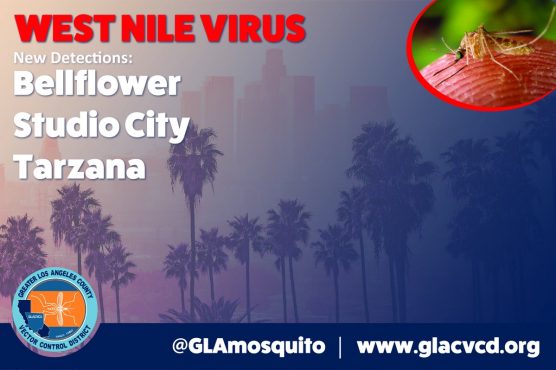Mosquito samples collected from mosquito traps in three Los Angeles County cities tested positive for the West Nile virus, officials confirmed Thursday.
The Greater Los Angeles County Vector Control District collected samples from mosquito traps in Bellflower (90706), Studio City (91602) and Tarzana (91356), confirming the presence of the virus in mosquito populations within the community.
While this confirmation serves as the District’s first positive West Nile virus mosquito pool this year, virus activity has been increasing steadily throughout California, including other vector control jurisdictions within the County.
Additionally, the district submitted a dead bird located in Valley Village which has been confirmed positive for WNV.
“West Nile virus is detected every summer by local public health agencies because it is endemic to Los Angeles County,” said Susanne Kluh, director of Scientific-Technical Services at GLACVCD. “This virus is spread through our bird population and transmitted to humans through the bite an infected mosquito.”
Because there is no human vaccine for West Nile Virus, residents must be proactive against mosquito bites by wearing insect repellent. Many mosquito repellents are available to prevent bites, but they do not all work equally well.
The Centers for Disease Control and Prevention recommend products with the active ingredients DEET, Picaridin, IR3535, or oil of lemon eucalyptus as being safe and effective against mosquitoes that can transmit disease when used according to the labels.
“Our agency will continue monitoring disease activity and treat affected areas to prevent a disease outbreak,” said Anais Medina Diaz, public information officer for GLACVCD. “But it is very important residents take precautions against mosquitoes and monitor for any symptoms of West Nile virus if they experience mosquito bites while outdoors during dusk and dawn.”
One in five persons infected with the virus will exhibit symptoms. Symptoms can include fever, headache, body aches, nausea, or a skin rash. These symptoms can last for several days to months.
One in 150 people infected with the virus will require hospitalization. Severe symptoms include high fever, muscle weakness, neck stiffness, coma, paralysis, and possibly death. If residents feel they are experiencing symptoms, it is strongly recommended to consult their primary care physician.
Mosquito control is a shared responsibility and residents must take an active role in reducing the threat of WNV in their neighborhoods by taking these additional steps:
– Eliminate standing water in clogged rain gutters, rain barrels, discarded tires, buckets, watering troughs or anything that holds water for more than a week.
– Ensure that swimming pools, spas, and ponds are properly maintained.
– Change the water in pet dishes, birdbaths and other small containers weekly.
– Request mosquitofish from your local vector control district for placement in ornamental ponds.
– Wear EPA-recommended insect repellent when outdoors where mosquitoes may be present.
– Report neglected (green) swimming pools in your neighborhood to your vector control district.
For an extensive list of sources and recommended solutions, visit www.tiptosstakeaction.org.
For more information, residents can contact the Greater Los Angeles County Vector Control District at 562-944-9656, online at www.glacvcd.org, or on social media.
Like this:
Like Loading...
Related





 Tweet This
Tweet This Facebook
Facebook Digg This
Digg This Bookmark
Bookmark Stumble
Stumble RSS
RSS




























REAL NAMES ONLY: All posters must use their real individual or business name. This applies equally to Twitter account holders who use a nickname.
0 Comments
You can be the first one to leave a comment.